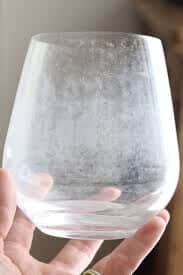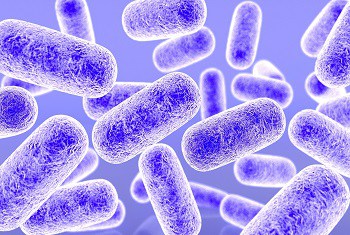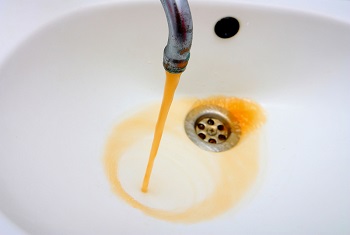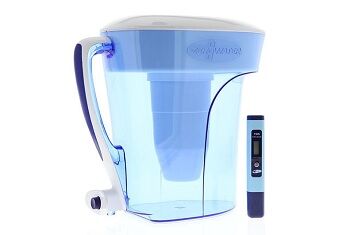Dry air is making your throat dry and your skin itchy. You have a humidifier but it has been sitting in the box since the day that you bought it. You set your humidifier on a table and are ready to use it, then you ask yourself, can I use tap water in my humidifier?
Tap water can be used in a household humidifier, but hard minerals and dissolved solids found in tap water can be distributed along with the humidifier mist and cause irritation when inhaled and also leave a white residue on surfaces.
Sometimes, ordinary tap water will be fine to use in a humidifier but in most cases, you will want to know what is in your tap water before putting it in your humidifier and having it spread throughout your home in a fine water mist.
Why tap water may not be the best choice of water to use in your humidifier.
A humidifier turns water into a mist to increase the humidity in the air which can have beneficial effects on your overall health. But not always!
Tap water is convenient, inexpensive, and looks perfectly fine to use in your humidifier, but according to the EPA (Environmental Protection Agency), it may not be your best choice of water to be used in your humidifier.
Tap water can have many things in it that you probably wouldn’t want to float around in the air that you breathe.
There may be hard minerals in your water that a humidifier will spread into the air.
Hard minerals and iron from well water can be inhaled from the mist of a humidifier and cause irritation in the mouth, nose, and throat.
Hard minerals can also be carried along with the water mist from a humidifier and distributed throughout the home leaving a fine white film on whatever it touches.

This white film is the same white film that is commonly seen on water faucets and showerheads from hard water, otherwise known as hard water staining.
Removing hard water stains from your water faucet is hard enough, removing hard water residue from an end table or nightstand can be very difficult.
Some tap water can have a mild odor which when put into a humidifier can be spread throughout the home making your minor water odor inconvenience, a major odor problem.
Tap water can also contain impurities like heavy metals, pesticides, and other chemicals from industrial run-off that would be introduced into your air by your humidifier.
Even heavy metals like lead can travel in the very tiny droplets that are created by a humidifier.
Salt from your tap water can leave a layer of salt when it goes through a humidifier.
Some tap water can have very high levels of salt that are not dissolved in the water but is still in a solid form and suspended in the water.
When this salty water settles on a surface and evaporates, it will leave behind a deposit of salt residue that will appear as a white spot on the surface, very similar to a spot left by hard water deposits.
Fortunately, a salt deposit is much easier to remove than a hard water deposit. If you use just a little water, you will be able to wipe a salt deposit clean with very little effort where a hard water deposit will require considerable scrubbing.
Using tap water can encourage mold growth in a humidifier.
Because average tap water contains minerals and impurities that would not normally be found in water that has been distilled, there is a higher chance that bacteria and other organic material will get their way into your humidifier and begin to grown.
Even a small amount of bacteria that finds its way into a humidifier can begin to breed and spread throughout the internal openings of a humidifier.

This is why it is so important to clean your humidifier with a disinfecting cleanser frequently before any bacteria can begin to multiply.
Organic material and impurities in tap water can also settle on the surfaces in your home and create a perfect breeding ground for air-bound bacteria that could leave a film, and sometimes a “PINK” residue from a bacteria sometimes called “PINKY” bacteria.
Iron in your tap water could ruin your humidifier.
Iron in your tap water is not only an annoyance because it can leave orange stains on your water fixtures but it can be a big problem if you put it in your humidifier.
There are typically two forms of iron in tap water and both forms can cause problems with a humidifier.
Ferrous iron is iron that is dissolved into your water, when ferrous iron settles on a surface it can give the surface a yellowish to brown coloring that can be very hard to remove without damaging the surface if the surface is soft or delicate.

By putting tap water that contains Ferrous iron, you are essentially spreading a mist of iron into the air that will settle on any exposed surface and the surface will gradually develop a yellow, orange, or even brown color.
For hard surfaces, this film can often be removed with a simple vinegar and baking soda mixture, but on softer surfaces like fabric, a gentle NON-CHLORINE-based fabric cleaner will do a good job at removing the stain.
Ferric iron is iron in the water that is not dissolved and is in a small particle form that can clog openings and cause moving parts to fail.
This form of iron in your water can create a coating inside of your humidifier which can clog openings and prevent watertight seals from sealing.
This build-up can eventually get to the point where your humidifier will stop working altogether and it will need to be replaced.
Never use a chlorine-based cleaner when cleaning an iron-based stain as it can react with the iron and make the whole situation worse.
Sulfur in your water could make your entire home smell like rotten eggs.
If you have the smell of rotten eggs in your tap water due to sulfur, you already know how bad your tap water can smell. Now imagine that rotten egg smell all-around your home because you put the smelly tap water into your humidifier.
Rotten egg smelling water is due to hydrogen sulfide gas that has been dissolved into the water and then released when the water is exposed to the air.
Just imagine what water with hydrogen sulfide gas in it would smell like when you put it in a humidifier to intentionally distribute the water into the air.
If you need to use sulfur-smelling tap water, do this first.
Pour the amount of tap water that you need to fill your humidifier into a pitcher or pot and let it sit for 24 hours.
This will allow much of the sulfur in the water to dissipate and therefore create less odor when used in your humidifier.
If your sulfur smell coming from your tap water is more than just a slight smell, running your tap water through a Brita water filter will greatly improve the odor of your water and make it much better for use in your humidifier.
Ideally, if you are going to use tap water in your humidifier, filtering it with a reverse osmosis system will greatly improve the quality of the water, or using an in-home water distiller will also purify your water to make it better for use in your humidifier.
Hot tap water is usually no better than cold tap water for a humidifier.
Some people think that because tap water is hot, it has been purified to some extent, and therefore it is better to use it in a humidifier than cold water.
Actually, the hot water that comes from your tap should be not near the minimum 171 degrees Fahrenheit temperature that is required for it to have any disinfecting effect.
Even if you feel like your tap water is very hot, it is highly unlikely that it is hot enough to have any disinfecting ability which means that it will not be any better in your humidifier than your cold tap water.
Acidic tap water from a humidifier can corrode metal.
Many people have water that is acidic coming from their wells.
Although acid that is dissolved in water can dissipate when it is exposed to air, this can take some time and acidic water that settles on metallic surfaces can slowly corrode the surface and leave an unsightly mark.
Before using any tap water in your humidifier, you should check the pH of the water. If the pH of your water is less than 7.0, you have acid in your water that can corrode metallic surfaces.
If you intend to use your tap water in your humidifier but are unable to test the pH of the water to determine if it is acidic, leaving the water out in a loosely covered container for 24 hours will help to allow the acid in the water to dissipate.
If the water that you are putting into your humidifier contains impurities that you don’t want to breathe or have covered the surfaces that the humidifier mist will make contact with, unfiltered tap water may not be the best water to put into your humidifier.
You can test your water for hardness with a simple water hardness test kit, or you can get more detailed test results with a complete water test kit to determine if your tap water is the water that you want to use in your humidifier.
How can you make tap water better for use in a humidifier?
In order for you to make your tap water better to use in a humidifier, you would have to remove the minerals contained in the water that could build-up inside of your humidifier and leave a white residue on the surfaces where the humidifier mist would settle on.
For most tap water, the most economical way to do this would be by the process of distillation, reverse osmosis, or filtering pitcher.
A reverse osmosis drinking water system uses the process of reverse osmosis to remove dissolved solids from your water, making it purer for drinking as well as better for use in a humidifier.
Most reverse osmosis drinking water systems will also remove impurities from your water that would cause the mist from your humidifier to have unpleasant odors.
And, of course, having a reverse osmosis drinking water system will provide you and your family healthier drinking water.
Should I use a home distiller to make my tap water better for my humidifier?
Using a home distiller will take your tap water a step further to removing impurities from your tap water so that you may use it in your humidifier because the process of distillation will remove all impurities from your tap water.
There are water demineralizing tablets available that claim to remove minerals from your tap water to make it better for use in your humidifier, but I have seen little proof that they actually work which makes sense since I don’t understand how simply dropping any tablet in your tap water could remove a physical particle from it.
From what I understand, these water demineralization tablets help to dissolve some minerals in your tap water so that they leave a less white residue after the humidifier mist settles on a surface and evaporates.
I’m quite sure that using demineralizing tablets in your tap water so you can use them in your humidifier couldn’t hurt, but from what I have learned about them, they do very little to make tap water better for use in a humidifier.
Will a Zerowater filter make tap water better for my humidifier?
A Zerowater filter is great for removing dissolved solids from your water and would make your tap water better for use in a humidifier.
Unfortunately, using a Zerowater filtering pitcher to purify your tap water to use in your humidifier could be more expensive than just buying a water distiller for your humidifier in the first place.
A set of 2 Zerowater replacement filters will cost you about $42.00 online, and usually even more if you get it from a retail store.
Each Zerowater filter will only provide you with up to 40 gallons of purified water if your tap water has less than the average amount of TDS (Total Dissolved Solids) in it.
How long a Zerowater filter lasts depends on how many dissolved solids that you have in your tap water, to begin with, and how many gallons of tap water that you use.
This means that each Zerowater filter will generally last between 3 and 5 months or 6 to 10 months for the 2 pack of filters, and that is just when they are used for drinking water purposes, they will last significantly less time if you are also using a gallon of purified water each day for your humidifiers.
When you consider that you can get your own water distiller to make distilled water right from your tap water for as little as about $80, why would you want to spend $42 over and over again and have to change the filters on your Zerowater dispenser?
Will a Pur water filter make my tap water better for my humidifier?
A Pur water filter is only for improving the taste and odor of your tap water and is not designed to remove minerals or dissolved solids as a water distiller would.
If you put your tap water in a Pur water filter, it will come out of it tasting better than it did right out of the tap and with less odor, but there will still be minerals and dissolved solids in the water that can leave a white residue when used in a humidifier.
What water should I use in my humidifier?
If at all possible, distilled water is the preferred water to be used in a humidifier because a water distiller is able to purify water better than most other methods of purifying water.
Water that has been softened and demineralized is a good alternative to distilled water because it has had most of the impurities removed from it.
If you own a reverse osmosis system, reverse osmosis water is a close second to distilled water, and if your tap water is relatively pure, to begin with, reverse osmosis water may be perfectly fine to use in your humidifier.
Using a Brita water filtering pitcher for your tap water will help to remove impurities that cause bad tastes and odors in your water, and using Brita filtered water in your humidifier may be fine depending on your tap water characteristics.
Whenever using tap water in your humidifier I always recommend using distilled water if possible or reverse osmosis water to remove as many minerals from your tap water as possible before using it in your humidifier, or at least use a water demineralization filter or cartridge.
To Sum Up!
A humidifier is designed to work best with water that is soft and free of any minerals or particles so whenever possible, use distilled water in your humidifier to give you the purest humidifying mist which will make your humidifier more effective.
If you must use unfiltered tap water in your humidifier, be sure to empty any old water out and replenish it with fresh water daily. It is also highly recommended to use a humidifier cleanser to keep the tank and internal parts of your humidifier clean.
Consider using a home water distiller to make your tap water better for use in your humidifier, and don’t forget to clean surfaces near the humidifier regularly to prevent the growth of bacteria that may be spread by your humidifier.


